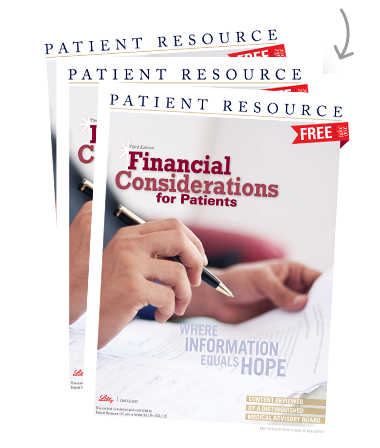Financial Considerations
What to Do if You Can’t Pay
No matter how well you plan your finances, you may find yourself in a situation where your bills become too big to pay. This situation is scary, but you should always remember that you are not alone in your struggle: One study showed that 68 percent of cancer patients and caregivers experience financial hardship during treatment. By remaining calm and organized, you can find ways to relieve your financial burden.
Get advice early
If you realize that paying your bills is getting more difficult, seek advice from a professional immediately. Many organizations, such as the Patient Advocate Foundation, provide free counseling to patients burdened by medical debt. They can help you apply for financial assistance and communicate with your doctors, insurers and creditors.
Reassess your finances
If you haven’t already, take an in-depth look at how and where you spend your money each month. Try to find small steps you can take toward lowering the amount you pay in bills without hurting your health. Some examples are carpooling or taking public transportation to cut gas costs, shopping with coupons, removing data from your phone plan, avoiding eating out and canceling paid subscriptions to magazines, Internet sites or cable.
Ask for help
Be proactive in finding a solution to your monetary troubles by looking for financial assistance. Talk to the providers who have sent the bill and inquire about any financial assistance options they offer to help patients struggling with payment. Many times your doctor can provide an application for a charity care program, begin the process for requesting a discount or a reduced bill, or arrange an affordable payment plan for the remaining balance.
Many nonprofit groups have programs to help patients who can’t pay their bills, including services like co-pay assistance, travel aid and child care. Apply for as many of these programs as appropriate. If you feel too tired or too stressed to handle this, ask someone you trust to find programs and help fill out the applications.
If you feel comfortable, reach out to your family and friends for financial help. This doesn’t have to mean asking for direct financial donations. Your loved ones may be able to offer you food to cut your grocery costs, living space to reduce your rent, child care support, or even space in a family cell phone plan to lessen your phone bill.
Help Is As Close As Your Smartphone
Finding help paying for your medications can be overwhelming, but thanks to the National Comprehensive Cancer Network’s new phone application – the NCCN Reimbursement Resource App – help is just a few taps away. Download the application through the Apple iTunes Store or Google Play Store, and you can search for reimbursement for your medications by your cancer type or drug name, or just browse available reimbursement or assistance programs.
The Healthcare Bluebook on the Apple iTunes store helps consumers save money by equipping them with “Fair Price” information about thousands of health care services and procedures that enables them to become smart health care shoppers. Due to price variances among providers, smart shoppers can save thousands of dollars on common procedures like MRIs, orthopedic surgeries, sleep studies and preventive screenings. Whether you have high deductible health insurance or no insurance at all, Healthcare Bluebook’s Fair Price will tell you what you should pay for a procedure.
Deal with debt
If your expenses outweigh your income, you may find yourself in debt. Communicate with your creditors to see if there’s a way you can postpone paying off your debt or settle your debt at a slightly reduced rate. If this is possible for you, it could buy you time to get back on your feet.
If you absolutely cannot find a way to get out of debt, filing for bankruptcy may be an option on the table. If you’re paying for necessities on your credit card, only making minimum payments on your credit card bills and avoiding calls from bill collectors – and you cannot foresee a change in your situation in the near future – you may want to consider filing for bankruptcy. Don’t approach this option lightly, however: Declaring bankruptcy may mean giving up many of your assets – possibly including your house or car – and could affect your ability to get loans later in life. If you think bankruptcy might be the right option for you, speak with a bankruptcy attorney to help you through the process, or you may qualify for free legal services through the court. Be honest with your attorney about your previous, present and anticipated financial concerns associated with your health care.
Don’t sacrifice your health
No matter what your financial situation is, never alter or stop your treatment without talking to your doctor. Many cancer patients avoid filling prescriptions or receiving treatment when they’re worried about paying the bills, but doing this can seriously damage your health. Your health care team can work with you to find a better solution. Never jeopardize your recovery from cancer because of financial difficulties.



